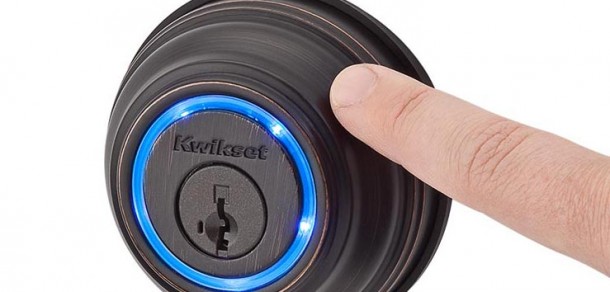UniKey focuses on user experience with mobile access
Shark Tank winner has a different take on physical access control
08 April, 2016
category: Biometrics, Contactless, Corporate, NFC
Before starting UniKey in 2010, Phil Dumas had thought a lot about mobile access control. He was hacking GSM SIM chips into cars for access and was working with fingerprint access control system in the mid-2000’s with Kwikset.
More than 10-years ago fingerprint readers weren’t what they are now. They could be difficult to use and because of this often didn’t work well, Dumas says. Individuals also had to be present for enrollment so registering someone remotely wasn’t really possible and the locksets were expensive. “With these issues I thought about moving the biometric identifier into the phone, as the phone is become a part of us,” he explains.
This was 2005, smart phones didn’t exist and the iPhone was still a couple years away. Dumas kept thinking about the idea and was working in another field he got wind that Apple would iPhone support Bluetooth Low Energy in 2010. The next year he founded UniKey. This was the technology needed to create the entry experience he was looking for and founded Unikey in early 2010.
To get funding for the company Dumas did something original, he appeared on the ABC’s “Shark Tank” in 2012 to pitch investors on his company. He ended up getting offers from all five “sharks” and ended up going with a deal netting $500,000 and giving up 40% of Unikey to Mark Cuban and Kevin O’Leary.
The idea around UniKey was to make the user experience as easy as possible while using the mobile device as the access token, Dumas says. “If you have to pull out your phone, open an app or enter a password it’s not easier than the traditional key, thus a poor user experience,” he adds.
The general idea is to make opening a locked door easier than pulling out a key, Dumas explains. The UniKey system enables a user to have the app running on their phone using Bluetooth Low Energy. When they get in range of the door it recognizes the user and opens when they either touch a button on the door lock or the doorknob. Keys can also be sent and provisioned to other users.
UniKey is not the only system out there to use Bluetooth for physical access. Other systems require the user to pull out there phone and then turn the devices and others require an app to be opened and actively controlled by the user
Instead of manufacturing locksets, UniKey is working with manufacturers and startups alike by licensing its technology. Dumas is working with Kwikset, Weiser and ERA and looking to work with others. “We have solved the really difficult smart lock problems with Bluetooth LE, mobile, cloud and the user experience,” he explains. “With our system lock companies can leapfrog years of development and provide a system that has already been proven, scaled and secure.”
Thus far the company has been focused on the residential market and had success globally. 2016 and beyond is placing a focus on the commercial market with hospitality and small and medium sized businesses. “We want to provide a great user experience for building access control in a cost effective platform,” Dumas says. “We’re bringing a disruptive cost profile and easy implementation where enterprise system are highly complex and highly expensive.”
Beyond that Dumas doesn’t see any reason the core technology can’t be used outside of physical access and eventually be used to replace the cumbersome passwords on computers and other devices.



